Podcast: Play in new window | Download
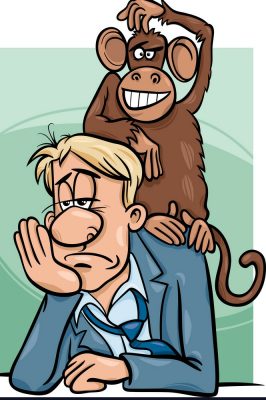 You say you don’t have a monkey on your back? If that were so, then you would be one in a billion:
You say you don’t have a monkey on your back? If that were so, then you would be one in a billion:
We all have a monkey on our back… one monkey or more. It’s a humanity wide issue… more on that in another article…
In this idiom the monkey is a problem that has been difficult to get rid of or to solve with the tools you have… with the mindset you have… It definitely feels like an uncatchable ball.
The monkey is often invisible to you, and unless someone else looks for it observing you, or you accidentally stumble on it, that monkey is influencing you in everything in life.
So what is the monkey… really?
It is that famous ‘I didn’t know that I didn’t know‘.
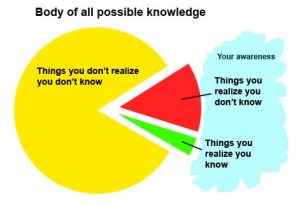 all knowledge parts: this is the knowledge pie.
all knowledge parts: this is the knowledge pie.
- part 1. you know that you know… your name, your gender, your weight, your height, you know your address, you know 4×4=16
- part 2. you know that you don’t know. I know that I don’t know Spanish, I don’t know the square root of 1377, I don’t know how far the moon is from Earth’s surface, I don’t know why my cells don’t allow sugar in… Most of these you can look up… and at least get an idea
- The surprisingly big part 3. what you don’t know that you don’t know. this is 90% of the knowledge pie. You need to dig for knowledge here, you need someone to teach you, you may need special filters (distinctions). You may need to look from a different angle to see it. So practically this is invisible to you and to others. I do all my work here… because this is from where we can disappear misery.
If the monkey on your back is really part of the ‘you didn’t know that you didn’t know’, then it is OUTSIDE of what you know that you know, and outside of what you know that you don’t know. For the most part even when people talk about it, it doesn’t register as valuable information…
Most people, when I ask them a question, they start to look in what they know…
And where do you store that? In your mind.
But I almost never ask a question in my classes that you know the answer of. I want you to look… So going to the mind is trying to find your keys under the lamppost… not where they are.
Going to the mind (instead of looking) is a typical action for a normal human… you assume that you already know the answer…
What can you do instead? Use ‘inductive‘ behavior.
Inductive? I had to look up the word too… it simply means look wider or look deeper… but beyond the area of what you know you know.
In my feeling, a few DNA capacities contribute to the ability to look and see wider and deeper:
- awareness capacity
- astuteness: meaning you actually see accurately what is in front of you
- your cone of vision… so you can see wider or deeper
- your ability to hold ideas, images in your brain while you are looking wider… so you don’t forget what you are looking for
- curiosity
- Your mental toughness aka your TLB. In fact your TLB is the most accurate predictor of your success in life.
- effective hate… yes, it is a capacity! hating how it is bad enough to make an effort, i.e motive power aka motivation.
If you don’t have enough hate for how it is, how you are, if you are OK with settling for what is good enough, close enough, or similar enough, … you won’t do well in exterminating the monkey on your back. In my experience, even when someone points it out for you, you won’t actually get it… you’ll prefer your own inaccurate and narrow view to theirs. You’ll keep the monkey…
 I have had students like that… And to my amazement, they kept on coming back.
I have had students like that… And to my amazement, they kept on coming back.
You know the effects of the monkey on your back, but you don’t know why it is there, you don’t know what you can do about it. So you try to fix it by doing this and you try doing that, you avoid this and you avoid that… but all that effort doesn’t get the monkey off your back. But the monkey doesn’t respond to fixing. Because the monkey is not wrong…
Until you actually see what it is that you don’t know that you don’t know, until, somehow, you make the invisible visible, you are in fixing mode. As I have said before…
…the fix of any problem is the next, bigger problem.
We could also say that a fix is not the same as a solution. A fix, the needing to fix, the wanting to fix, the should fix is the result of something looking like it’s wrong. Solutions, on the other hand answer the how question, mathematical problems are a good example.
Wrong is created by words. In fact there is never anything wrong in reality… without someone saying: it’s wrong, wrong would not exist. But avoiding saying the word doesn’t disappear it… it is, again, your trying to fix wrong by not speaking it. But wrong, in your mind, gets stronger with every instance of you avoid saying it.
 Magical thinking of a 2-year old covering its face: if I don’t see you you don’t see me. Peek-a-boo.
Magical thinking of a 2-year old covering its face: if I don’t see you you don’t see me. Peek-a-boo.
In this article we’ll look at a different way of looking at things.
We’ll look differently so you can start seeing things not as wrong but closer to how they are, and then take effective action to create something new.
If there is nothing wrong, then there is nothing to fix: fixing will become a non-issue.
So let us look what is that monkey on your back… Oh, the biggest monkey was that you said something was wrong… and that is a big monkey. But it’s not the only monkey you have, although it may be at the root of all the other monkeys.
Here is a big monkey: a huge monkey: think positive… avoid negativity
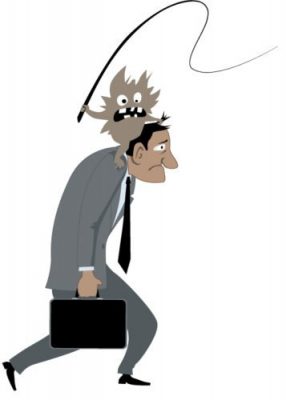 The only thing that produces result is what you do… i.e. action. Your thoughts matter, but only to the extent that they influence what you do.
The only thing that produces result is what you do… i.e. action. Your thoughts matter, but only to the extent that they influence what you do.
But what really happens is this: you see something. You interpret it accurately or inaccurately. And depending on that interpretation, you act…
I know some people (too many?) teach that your thoughts create stuff… but what they don’t say is how, when, why, and when not: and if not, why not?
They also don’t clarify what is thought… if you mess something up and say: ‘you are an idiot!’: did your thought just created reality? Are you now suddenly really an idiot?
No distinction. No astuteness. For you everything is the same as everything else… except that not always.
This widespread lack of distinction has infected humanity for about 125 years now… and is causing humans to degenerate… devolve… and become less human, less productive, less intelligent.
In this article I will endeavor to address some of the missing distinctions.
You won’t like it, but between you and me, to get from misery to joyful, you will need to swallow a few bitter pills… that is how life works.
The more willing you are to swallow the bitter pills the further you can go.
And, between you and me, that is the first secret that they don’t convey to you: living with your eyes open, being able to remain calm and collected while you look at bad, unpleasant, threatening stuff is the secret of people who are reasonably happy, powerful, and effective in life.
If you follow the positive thinking bullshit, you don’t allow negative thought in your mind, you are on the wrong path: you are working against happy, powerful, and effective life.
If you can’t tolerate bad news about you… if the moment you see something you immediately take yourself out of the conversation, trying to justify, explain, then your TLB is too low to do this work effectively, and you’ll remain miserable, powerless and ineffective… and you know if I am talking to you because you recognize yourself.
Why is it a bad practice to block out or resist negative, i.e. non-pleasing thoughts, events, ideas, images?
Many reasons. Here are a few:
When you block out what you don’t like to see, the primary symptom of a low TLB aka low mental toughness person, your integrity is also low. It must be. But, bummer, without integrity life doesn’t work. How well does your life work?
First: let’s look at what we mean by life working?
If you look at different areas of your life, you can rate the level of workability, the level of satisfaction, the level of friction, the level of fulfillment in each one…
Look at these four areas:
- 1. your health. How healthy are you? To what degree are you able to do the things: you would like to do, the things you need to do well enough and fast enough?
If you had to run from a flood: could you reach a hill a mile away from your home, carrying your children, or some of your possessions?
If you needed to: can you go to the store and buy and carry your groceries home… walking?
![]()
 I am asking all these questions because maybe you are deluding yourself.
I am asking all these questions because maybe you are deluding yourself.
A few years ago we did this inventory exercise, and a friend said his health was a 9. He looked healthy, he worked out, but when soon after we went for a stroll around Green Lakes, he ran out of juice after half a mile… and he dragged himself for the remaining 2.3 miles… While at the time that walk was no big deal for me.
This was 12 years ago… His health, given how far he could go, was a 3 on a scale of 1 to 10.
Also, look at the quality of sleep, your ability to pay attention, to focus, to get things done. These are all health issues.
- 2. your work/fulfillment
- 3. your money
- 4. your relationships
the four pillars of life…
If you are intelligent enough, if you can do mental simulation, you will be able to follow what I am saying next.
The chocolate covered rat droppings: Adding some positive to a shitty situation won’t make it better. What will make it better is calmly observing and gently removing what causes the situation to be shitty.
I learned this lesson as a young child.
When I grew up my mother worked full time, and she also pursued her education: she got two master’s degrees before I turned 9. My younger brother is six years younger than me.
So we were left with a live-in ‘nanny’. She cooked, she cleaned, and she made sure we didn’t kill ourselves, the three kids.
One day this young woman put too much salt into some stew, and to fix it, she put sugar in.
Of course that made the dish inedible… She did what you do, day in and day out: you add something that hopefully make the whole area better… but that method doesn’t work. A vitamin, a superfood, an argument, a demand, an ultimatum, you have thousands of actions that are all designed to fix something that you messed up.
Here is an example: mine.
I have digestion problems all the time. I have never had a good day since I was born. Some days it’s tolerable, other days… not so much.
One of the issues is pain. My organs press on each other (don’t forget I was a very underdeveloped preemie when I was born) and that hurts.
So I do best when I eat very little.
No medication helps, no food list helps, no superfoods, no special diets, no. The only thing that makes life tolerable if I eat only little, so my stomach weighs little, and then the pain is tolerable.
I muscletest food lists for people. The most important part of the food list is the ‘do not eat, do not drink’ part of the list.
Every single client complains that I don’t have a category: this is what will make you better food… But…
If you just eliminate the ‘do not eat’ items from your diet, you’ll be 100 times better and fast.
Instead I see people take supplements to ‘compensate’ for the damage eating those ‘do not eat’ foods… and of course it doesn’t work. It can’t work. No integrity.
The same is with all behaviors, all attitudes, everything.
The Anna Kerenina Method… eliminate what doesn’t work, and you’ll be left with what does work.
Or the Sherlock Holmes method: When you have eliminated the impossible, whatever remains, however improbable, must be the truth?
Another example, also mine:
yesterday I could barely see my computer screen. I didn’t run to the eye doctor, didn’t increase my prescription on my glasses… I looked what I did that could do that.
I realized that I was reading my kindle for six hours straight… and that was the matter.
So I am resting my eyes today and made myself a new rule: don’t read the kindle more than an hour at a time. Take a break.
Things that you don’t know that you don’t know effect you.
Saying ‘I don’t know’ seems to be hard for people to say. Saying ‘I can find it on google’ is a little easier… but if you don’t know that you don’t know it, then you probably don’t have a good question to ask google… so you won’t find out what it was that you didn’t know.
What most people do is live inside the slices of the knowledge-pie called: ‘you know that you know’ and ‘you know that you don’t know’.
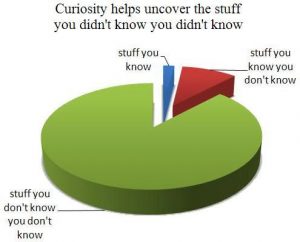 But all the power comes from the ‘you don’t know that you don’t know’ slice… but you can’t get to it directly, because it is invisible.
But all the power comes from the ‘you don’t know that you don’t know’ slice… but you can’t get to it directly, because it is invisible.
My articles, my courses, my coaching are all designed to poke the ‘you don’t know that you don’t know’ area of the knowledge-pie.
The tools to penetrate that area are distinctions. You get there through distinctions.
I touched on a few distinctions even in this simple article… and I always do.
Fixing, wrong, elimination, chocolate covered droppings, positive thinking, TLB, etc.
If you managed to distinguish for yourself the distinction ‘wrong’, that one distinction alone would start giving you access to that area of the pie, the area from where all the power comes.
Truthfully, until you get that distinction, pretty much nothing else will become visible.
But once you have one distinction, even just one distinction as a distinction, you’ll have a way to look through that distinction to discover more monkeys on your back and get them off.
Positive thinking is the opposite of what works. Positive thinking, whether you realized it or not, relegates, ignores, and declares war on half of reality by saying it’s wrong.
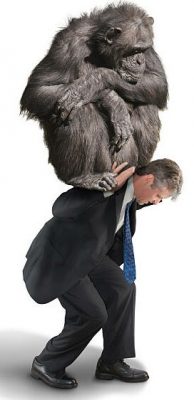 And it has resulted in you having this big monkey on your back. A big monkey that you put there by mistake… And life has stopped working, instead of what you’d hoped: that life would become better.
And it has resulted in you having this big monkey on your back. A big monkey that you put there by mistake… And life has stopped working, instead of what you’d hoped: that life would become better.
I learned the methodology of accessing the invisible during my years of participating with Landmark Education. In addition to what I learned there, I have also accessed about one hundred additional items that I didn’t know that I didn’t know… items no one else had distinguished before me.
I teach many distinctions in my 53 invisibles program, and in my new Distinctions Podcast.
My podcast is weekly. It is getting better and deeper.
The calls are about 90 minutes long. I teach my call partner… and you’ll recognize yourself in what she is dealing with, so it is perfect.

good work Jayme…
yes. another way to look at incompetence is that without incompetence, you cannot get to competence.
the path, for everyone is 1. unconscious incompetence 2 conscious incompetence (you just did these two steps) 3. conscious competence through learning 4. unconscious competence through lots of practice.
Without establishing unconscious incompetence, it is impossible to teach you.
I bought a course on article writing. I just broke it open today.
I had to go through this same process: OK, I am incompetent… even though I have been writing articles for 10 years now, and have 4500 on my site, and people like it.
But yet I can declare myself incompetent, and enable myself to be trained to get to the next level where my articles will be emissaries for me and my programs in the world… that is what I’d like to accomplish.
And that is a whole different kind of article writing…
I just thought about what incompetent really means from your podcast. The word has too much stigma and fog around it. Incompetent=not competent, right? If I’m trying to learn something my incompetence should be a given, and to think of it with that AWFUL (haha) word is just… awful. But it’s not an awful word at all! It’s not an insult! That hit me. I don’t take classes because I’m COMPETENT. I don’t ask for my starting point measurements or get readings from yahoos because I’m competent in my self-awareness. I know that to some degree, but it’s a satisfying slap in the face to declare incompetence. Hey, I don’t know! I can listen now, you know? Just dissecting that word a little got me thinking. And yeah, memories soul correction, it CHASES me. I can’t run anymore (not so fast anyway). I can get curious about things knowing I’m incompetent. I’m liking incompetence more and more. It’s not a bad place to be.
Yes, I see your machine, Jayme.
This is why the declaration I learned back in 1987: if you want to get trained, you need to declare yourself incompetent… or you won’t get trained.
But you need to generate the, so you don’t depend on what other people say you can or can’t, know or don’t know.
I think I am actually capable of finishing things (or starting them), but I can never light that “fire under my ass” on my own. If someone tells me “you would never do xyz thing” I get mad and am determined to do it. That is obviously not a sustainable method. I need to forget that I think I know things. I probably don’t. It’s like I’m better at working on something I don’t think I could ever ever do. Kind of like admitting incompetence from your distinctions lessons I think. I can actually focus when I’m sure I know nothing about a subject, I really think I’ll fail, so no pressure. I overcompensate, try harder and do better. When I think I know something or should be good at it, I try it once, give up, then sulk. I need to forget what I think I know about my abilities. I think I’m my own monkey. Thank you